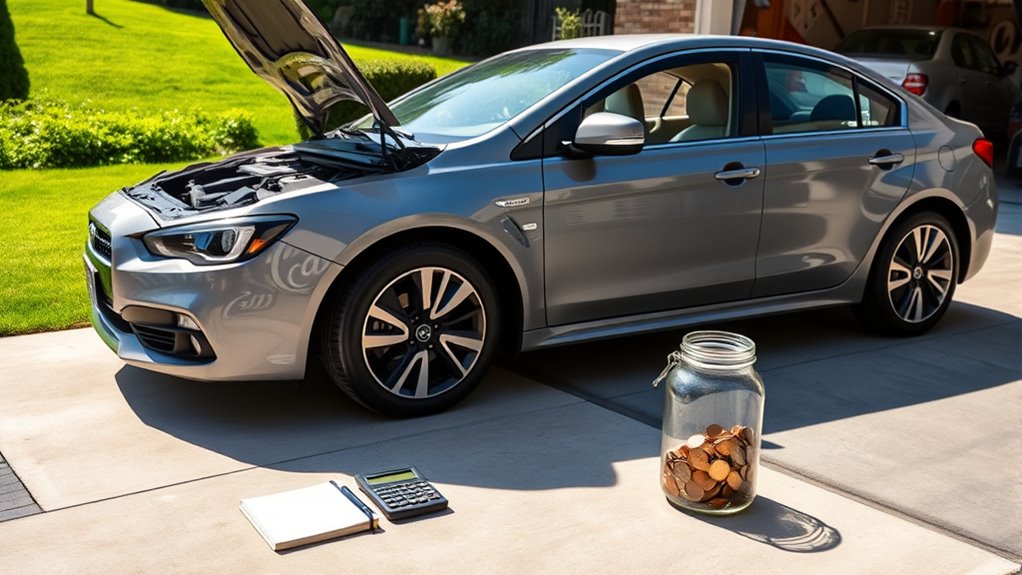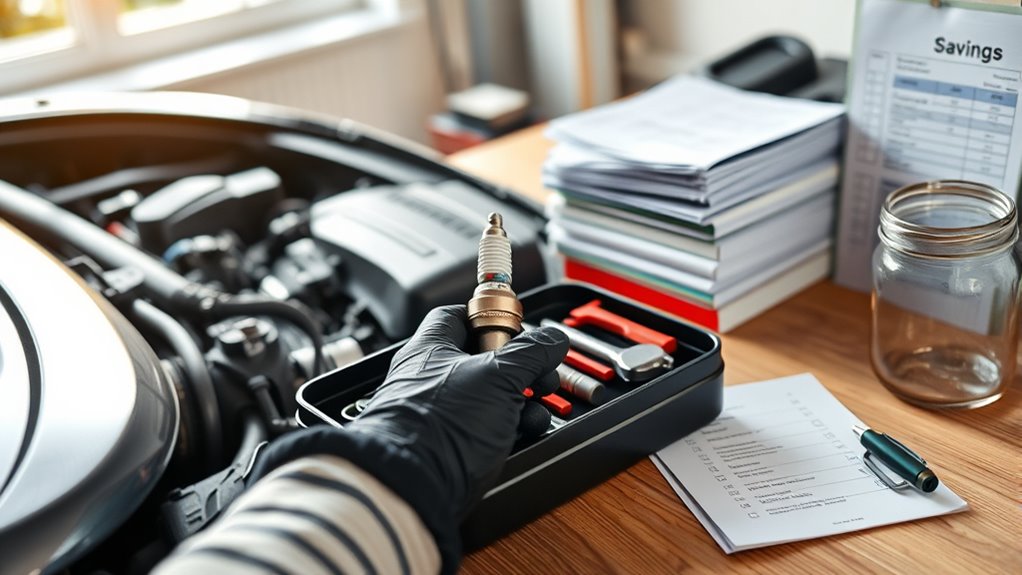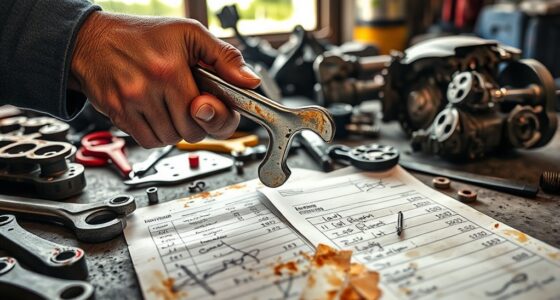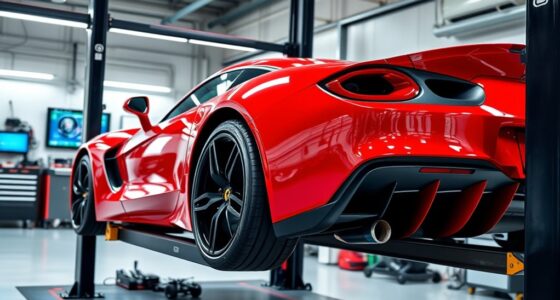To budget for car maintenance, start by setting aside about 10% of your vehicle’s value annually, or begin with a smaller, manageable amount. Keep a dedicated savings account for maintenance and repairs, including routine services like oil changes and tire rotations. Stay informed about recalls and get multiple quotes for repairs. Planning ahead keeps costs predictable and prevents surprises. If you want to learn effective strategies, keep exploring ways to stay ahead of expenses.
Key Takeaways
- Allocate about 10% of your vehicle’s value annually for maintenance and repairs, starting small if needed.
- Create a dedicated savings account specifically for car expenses to prevent mixing funds.
- Schedule regular maintenance like oil changes and tire rotations to prevent costly breakdowns.
- Track your vehicle’s history and anticipate upcoming major repairs to spread out costs.
- Obtain multiple repair quotes and choose trusted mechanics to save on labor and parts.

Have you ever wondered how to keep your car running smoothly without breaking the bank? Managing your car maintenance budget might seem overwhelming, but it’s doable with a solid plan. One of the first things to consider is understanding how your insurance costs and fuel efficiency play into your overall expenses. Insurance costs can fluctuate based on your driving habits and the type of coverage you choose, so shopping around for the best rates and bundling policies can save you money. Improving your fuel efficiency is also a smart way to cut costs—regular oil changes, maintaining proper tire pressure, and reducing unnecessary weight in your vehicle all contribute to better gas mileage, which directly impacts your monthly spending.
Next, it’s vital to set aside a dedicated fund for maintenance and repairs. Experts recommend saving about 10% of your car’s value annually, but if that feels steep, start small and build over time. Consider opening a separate savings account specifically for this purpose, so the money isn’t mixed with other funds. When planning your budget, don’t forget to account for routine services like oil changes, tire rotations, and brake inspections. These may seem minor but can prevent major repairs down the line, saving you money in the long run. Staying consistent with these preventative measures also helps keep your vehicle’s fuel efficiency high, meaning you’ll spend less on fuel overall.
Another way to save is by staying informed about recalls and service bulletins for your vehicle. Sometimes, manufacturers offer free repairs or discounts for specific issues, which can substantially reduce your expenses. When it comes to repairs outside of routine maintenance, always get multiple quotes and consider trusted mechanics rather than rushing to the first shop you find. This helps you avoid overpaying and ensures quality work, which keeps your car running well and minimizes future costs. Additionally, understanding how regular maintenance, such as oil changes and tire rotations, can extend the lifespan of your vehicle and prevent costly repairs.
Finally, planning ahead for larger expenses is vital. Instead of waiting until a breakdown occurs, budget for big-ticket items like replacing tires, batteries, or timing belts. If you keep track of your vehicle’s history and anticipate upcoming needs, you won’t be caught off guard. This proactive approach means you can spread out costs and avoid financial strain. By prioritizing regular maintenance, understanding the impact of insurance and fuel efficiency, and saving diligently, you’ll keep your car running smoothly without overspending. With a bit of planning, you’ll enjoy reliable transportation and a healthier wallet.
Frequently Asked Questions
How Often Should I Schedule Routine Car Maintenance?
You should schedule routine inspections based on your car’s maintenance schedule, typically every 5,000 to 7,500 miles or every 6 months. Following your vehicle’s maintenance schedule helps keep it in top shape and prevents costly repairs. Regularly checking fluids, tires, brakes, and filters guarantees your car runs smoothly. Stay proactive with routine inspections, and you’ll avoid unexpected breakdowns and extend your vehicle’s lifespan.
What Are Hidden Costs in Car Repairs?
Hidden costs in car repairs can hit you like a ton of bricks, making your budget explode! These hidden expenses include unexpected labor charges, parts that suddenly need replacing, and diagnostic fees that sneak up on you. To avoid surprise costs, always do a detailed cost estimation before repairs and ask your mechanic about potential hidden expenses. Being prepared helps you stay in control and keeps your car maintenance affordable.
How Can I Build an Emergency Fund for Unexpected Repairs?
You should start by building an emergency savings fund dedicated to unexpected repairs. Set aside a small amount each month, even if it’s just $20, to gradually grow your fund. Incorporate repair planning into your budget, so you’re prepared for surprise costs. This way, you’ll have financial cushion during urgent repairs, reducing stress and avoiding debt. Consistent saving guarantees you’re ready for any unexpected car repair expenses.
Are Aftermarket Parts Cheaper and Reliable?
Thinking about aftermarket parts? They often appear as a savvy choice, offering a cost comparison that can be quite appealing. While some aftermarket parts are budget-friendly and reliable, others may not meet the same standards as original equipment. You should research brands carefully, read reviews, and consider the specific part’s reputation before making a decision. This way, you guarantee you’re saving money without sacrificing your car’s performance or safety.
How Does Driving Style Affect Maintenance Costs?
Your driving habits considerably impact maintenance costs. Aggressive driving, like rapid acceleration and hard braking, can wear out parts faster and reduce fuel efficiency, leading to more frequent repairs and higher fuel expenses. By adopting smoother driving habits, you’ll improve fuel efficiency and extend your vehicle’s lifespan, saving money in the long run. Consistent, gentle driving not only lowers maintenance costs but also enhances overall vehicle performance.
Conclusion
By budgeting wisely, you can avoid unexpected repair costs and keep your car running smoothly. It’s easy to think of maintenance as a burden, but with proper planning, it becomes a safeguard rather than a surprise expense. When you set aside a little each month, you’re not just saving money—you’re gaining peace of mind. In the end, a well-maintained car isn’t just about avoiding repairs; it’s about enjoying the journey without worry.









